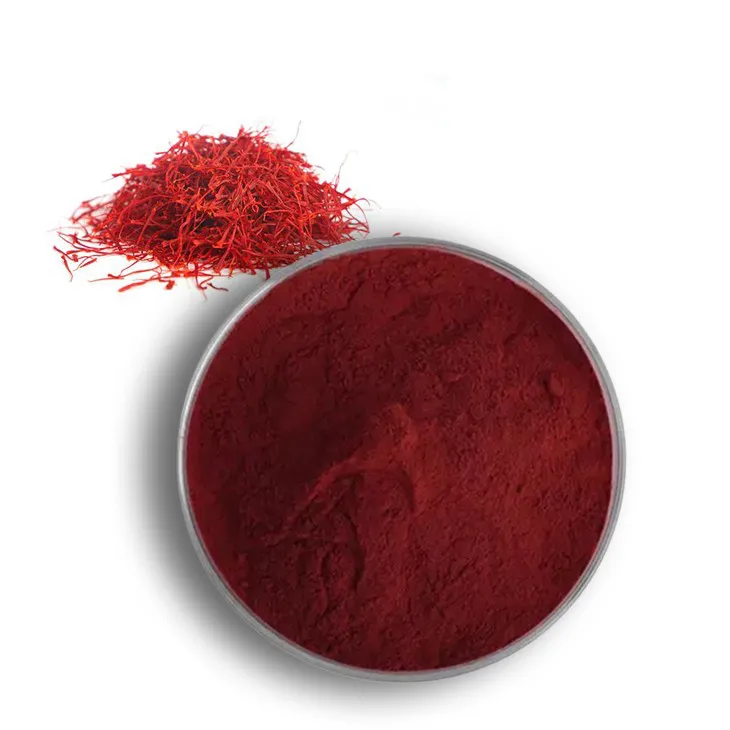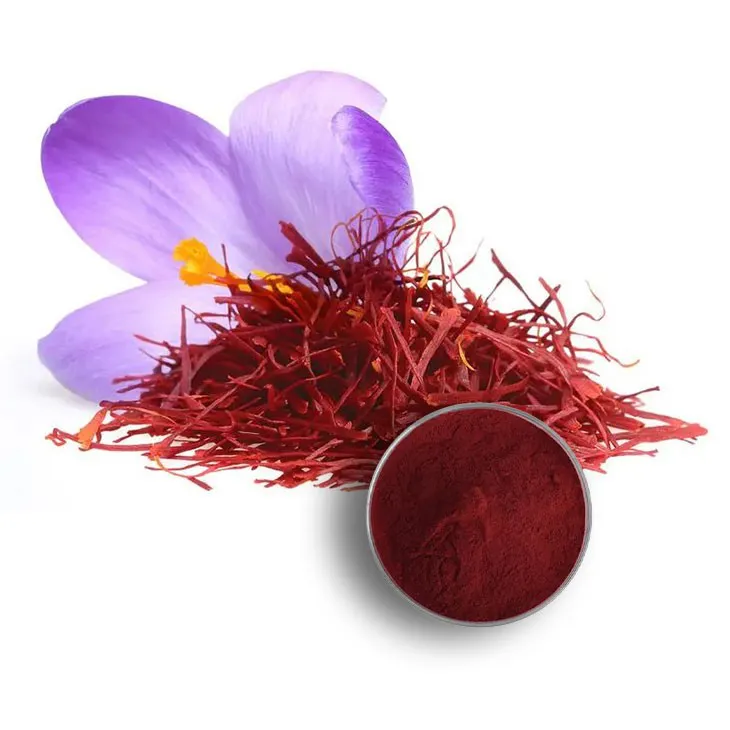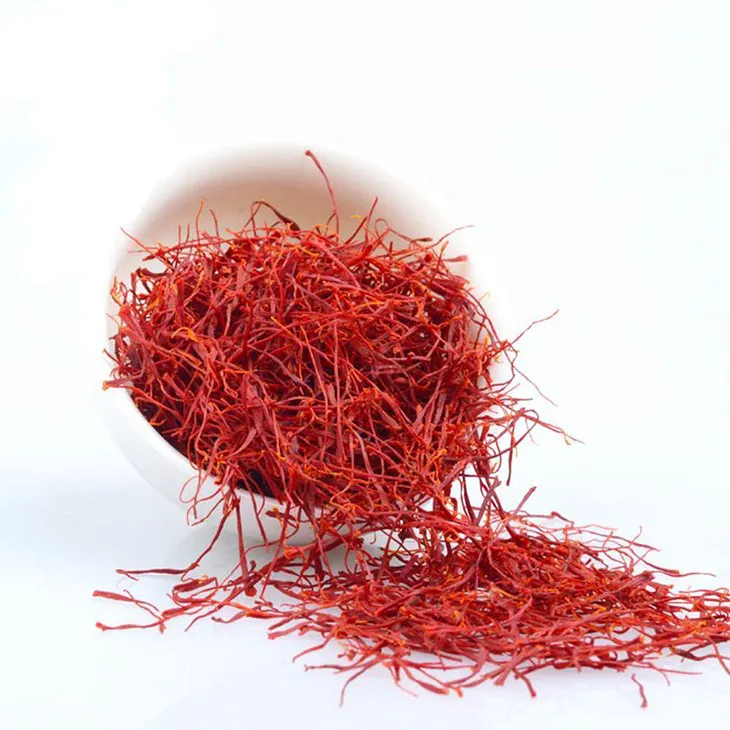- 0086-571-85302990
- sales@greenskybio.com
Saffron extract powder and liquid extract - 100% natural (standardized).
2024-12-14

What is Saffron?
Saffron, known as the "red gold," is one of the most precious and exotic spices in the world. It is derived from the flower of Crocus sativus. This flower is native to Southwest Asia and has been cultivated for thousands of years. Saffron has a distinct appearance, with its long, thin, red - orange stigmas that are carefully hand - picked for use.

The Production of Saffron Extract
Harvesting Saffron
The process of obtaining saffron begins with the delicate harvesting of the flower. Since each flower only produces a small amount of saffron (three stigmas per flower), a large number of flowers are required to produce a significant quantity of saffron. Harvesters must be extremely careful during this process to ensure the integrity of the stigmas.Extraction Process
Once harvested, the saffron is then used to create the extract. For the powder extract, the saffron is dried and then ground into a fine powder. In the case of the liquid extract, solvents are often used to draw out the active components of saffron. However, in a 100% natural (standardized) extract, these solvents are carefully chosen to be natural and safe. The extraction process is carefully controlled to ensure that the final product contains a consistent amount of the beneficial compounds found in saffron.
Beneficial Compounds in Saffron
Saffron contains a variety of bioactive compounds that contribute to its numerous health benefits. One of the key compounds is crocin, which gives saffron its characteristic color. Crocin has been studied for its antioxidant properties. Another important compound is safranal, which is responsible for saffron's unique aroma and has potential anti - inflammatory effects. Additionally, saffron contains picrocrocin, which may play a role in digestive health.

Health Benefits of Saffron Extract
Mood Stability
Saffron extract may have a positive impact on mood stability. Some studies suggest that it can be effective in treating mild to moderate depression. The exact mechanism is not fully understood, but it is thought that the bioactive compounds in saffron may interact with neurotransmitters in the brain, such as serotonin. By influencing the levels of these neurotransmitters, saffron extract could potentially improve mood and reduce symptoms of depression.Aiding Digestion
As mentioned, the presence of picrocrocin in saffron may contribute to digestive health. Saffron extract can stimulate the secretion of digestive enzymes, which helps in the breakdown of food. This can lead to improved digestion, reduced bloating, and better absorption of nutrients. It may also have a soothing effect on the digestive tract, making it beneficial for those with sensitive stomachs.Antioxidant Support
The antioxidant properties of saffron extract are significant. Antioxidants are substances that help protect the body against oxidative stress, which is caused by free radicals. Free radicals are unstable molecules that can damage cells and contribute to various health problems, including aging, cancer, and heart disease. The crocin and other antioxidants in saffron extract can neutralize these free radicals, reducing the risk of cellular damage and promoting overall health.Uses in Culinary Arts
Saffron has a long and rich history in culinary arts. It is used in a variety of dishes around the world. In Mediterranean cuisine, it is a key ingredient in paella, adding a distinct color and flavor to the dish. In Indian cuisine, saffron is used in biryanis and various sweets. The powder and liquid extracts can also be used in cooking. The liquid extract can be easily added to sauces, soups, or marinades, while the powder can be sprinkled on top of dishes or incorporated into dry rubs for meats.
How to Incorporate Saffron Extract into Your Diet
Liquid Extract
- In Beverages: Add a few drops of the liquid saffron extract to your morning tea or coffee. It can add a unique flavor and also provide the health benefits. - In Smoothies: Blend a small amount of the liquid extract with your favorite fruits and vegetables in a smoothie. This is an easy way to incorporate saffron into your diet if you don't like the taste on its own.Powder Extract
- In Baking: Sprinkle a small amount of saffron powder into your cake or muffin batter. It will not only give a beautiful golden color but also a delicious flavor. - In Seasonings: Mix saffron powder with other herbs and spices to create a unique seasoning blend for meats, fish, or vegetables.Safety and Precautions
While saffron extract is generally safe for most people when used in moderation, there are some precautions to keep in mind. - Pregnancy and Breastfeeding: Pregnant and breastfeeding women should consult their healthcare provider before using saffron extract, as high doses may have potential risks. - Allergies: Although rare, some people may be allergic to saffron. If you experience any allergic reactions such as itching, swelling, or difficulty breathing after using saffron extract, discontinue use immediately and seek medical attention. - Dosage: It is important to follow the recommended dosage on the product label. Taking excessive amounts of saffron extract may lead to side effects such as nausea, dizziness, or dry mouth.
Conclusion
Saffron Extract Powder and liquid extract - 100% natural (standardized) offer a wealth of potential benefits. From its role in promoting mood stability and aiding digestion to providing antioxidant support, saffron extract has much to offer. Its long - standing use in culinary arts also makes it a versatile and interesting addition to the diet. However, as with any supplement, it is important to use it safely and in accordance with the recommended guidelines. By exploring the world of saffron extract, consumers can potentially enhance their well - being and enjoy the unique qualities of this remarkable natural product.
FAQ:
What are the main benefits of saffron extract?
The saffron extract may have several benefits. It could play a role in improving mood stability, which might be related to its potential impact on neurotransmitters. It can also aid digestion, perhaps by influencing the digestive system's functions. Additionally, it provides antioxidant support, helping to combat free radicals in the body.
Is the Saffron Extract Powder and liquid extract safe?
Since it is 100% natural and standardized, it is generally considered safe for most consumers. However, as with any supplement, some people may be allergic to saffron. It is always advisable to consult a healthcare professional before starting to use it, especially if you have pre - existing health conditions or are taking other medications.
How is the saffron extract standardized?
Standardization of saffron extract involves ensuring that it contains a consistent amount of the active components. This is typically achieved through precise extraction and quality control processes. These processes are designed to maintain the proper balance of the beneficial substances found in saffron, so that each batch of the extract has a reliable and consistent composition.
Can saffron extract replace saffron in cooking?
While saffron extract contains the essence of saffron, it may not be a perfect substitute in cooking. Saffron in its whole form imparts a unique flavor and color to dishes. However, the extract can still add some of the saffron's flavor and potentially some of its health benefits. But for traditional culinary uses where the full saffron experience is desired, using whole saffron strands might be more appropriate.
How should I store Saffron Extract Powder and liquid extract?
For saffron extract powder, it should be stored in a cool, dry place, away from direct sunlight. It is best to keep it in an airtight container to prevent moisture absorption. For the liquid extract, it should also be stored in a cool place, preferably in a dark - colored bottle to protect it from light. Some liquid extracts may need to be refrigerated, so it is important to follow the manufacturer's instructions.
Related literature
- The Medicinal Properties of Saffron: A Review"
- "Saffron in Traditional and Modern Medicine: A Comprehensive Overview"
- "Standardization of Saffron Extracts: Current Practices and Future Perspectives"
- ▶ Hesperidin
- ▶ Citrus Bioflavonoids
- ▶ Plant Extract
- ▶ lycopene
- ▶ Diosmin
- ▶ Grape seed extract
- ▶ Sea buckthorn Juice Powder
- ▶ Fruit Juice Powder
- ▶ Hops Extract
- ▶ Artichoke Extract
- ▶ Mushroom extract
- ▶ Astaxanthin
- ▶ Green Tea Extract
- ▶ Curcumin
- ▶ Horse Chestnut Extract
- ▶ Other Product
- ▶ Boswellia Serrata Extract
- ▶ Resveratrol
- ▶ Marigold Extract
- ▶ Grape Leaf Extract
- ▶ New Product
- ▶ Aminolevulinic acid
- ▶ Cranberry Extract
- ▶ Red Yeast Rice
- ▶ Red Wine Extract
-
Milk Thistle Extract
2024-12-14
-
Ivy Extract
2024-12-14
-
Nettle Root Extract
2024-12-14
-
Curcuma Longa Extract
2024-12-14
-
Alfalfa Meal
2024-12-14
-
Maitake Mushroom Extract
2024-12-14
-
Red Date Extract
2024-12-14
-
Peppermint Oil
2024-12-14
-
Lotus leaf extract
2024-12-14
-
Camu Camu Extract
2024-12-14





















